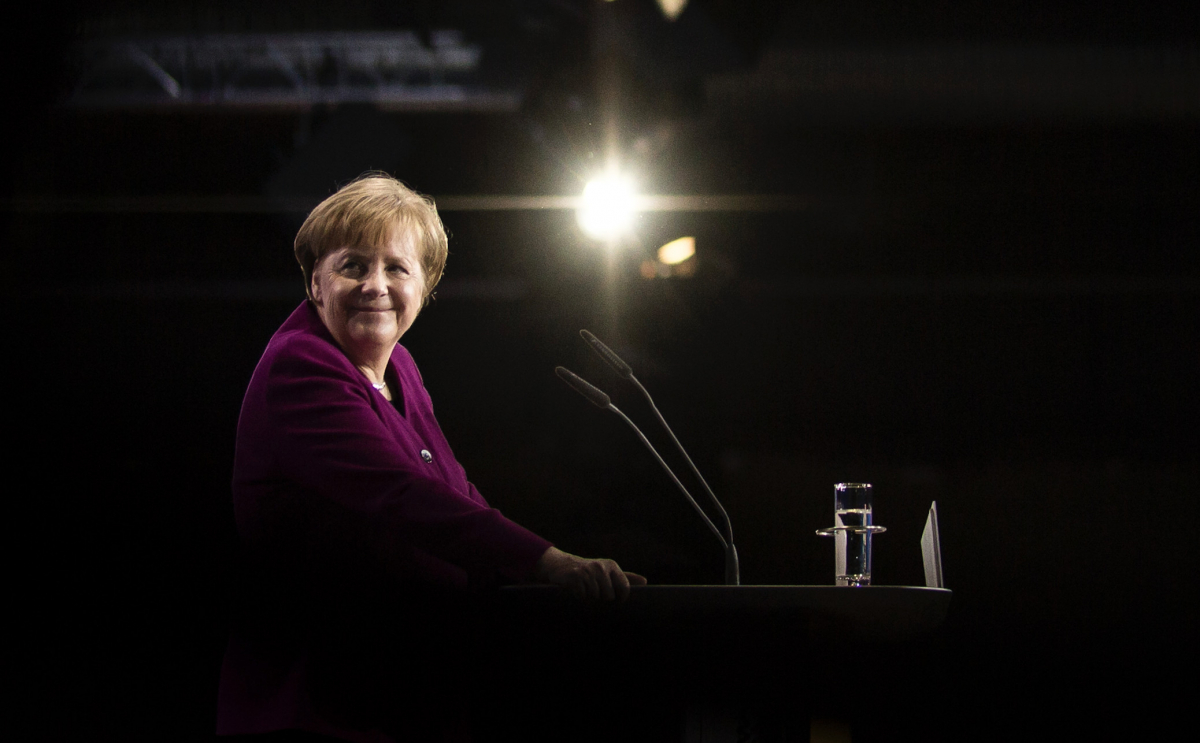Merkel’s public appearances: Rhetorically weak, but authentic
Angela Merkel, who has been repeatedly voted the most powerful woman in the world by Forbes magazine, is undisputedly a political exception. While she definitely won’t go down in history as a gifted, engaging speaker, her career has been one of transformation. “She quickly learned the rules of a safe appearance, has become more decisive and much more certain in dealing with the public,” says the executive trainer for rhetoric and demeanor, Silvia Agha-Schantl. Some things have remained the same in terms of their language, their facial expressions and gestures as well as their style of movement and the outgoing Chancellor has not been able to resign even in 16 years of reign: These include her sibilant error, her amplitude and her frequency. But what exactly does the expert mean by that?
“Merkel’s very distinctive sibilant mistake has been with her from the start in her career and she has not changed anything to this day, which would have been possible with continuous speech training,” says Agha-Schantl. Sibilants are the sounds / s /, / sch / and / ch /. Above all, Merkel expresses it very sharply. A faulty articulation of these sounds is called a sibilant disorder by speech therapists. By amplitude, the communication trainer means her generally rather low level of movement. The top politician is not a woman of grand gestures. The raised hands when cheering in the football stadium? Rather a rarity. Not only the range of movements per se, but also the speed, which Agha-Schantl describes as frequency, is low. Merkel always rests in herself.
This immobility is a disadvantage for a manager when it comes to rousing speeches, but she has made this trait work for her. The outgoing Chancellor has turned weakness into strength. “What she has learned over the years is how to deal confidently with stressful moments in public. She can no longer be put under pressure and signals more clearly ‘No, not now!’ if, for example, she doesn’t want to give an interview, ”says Agha-Schantl. This security wasn’t always there at the beginning of her career. In contrast to the former US President Barack Obama, who also had a calm demeanor, she initially seemed mostly more relaxed. “You often missed emotions in expression, such as a relaxed smile on your face.” That got better over time.
Legendary and discussed in countless non-fiction books on body language is the “Merkel diamond”, the name of which the outgoing Chancellor coined. In this gesture, the outstretched fingers form a diamond in front of the center of the body. The fingertips point slightly forwards and downwards. But what does this gesture reveal? Is it to be assessed negatively or positively? “Neither,” says the executive trainer for rhetoric and demeanor. “That cannot be judged on the basis of a gesture alone. The overall context and several signals at the same time always count here. ”These gestures are often used by Angela Merkel while she is standing, while she is thinking or speaking. This is a car contact, a so-called “self-touch”, which always has a calming effect on the users themselves.
Those interested could try it out for themselves and just let their hands hang next to them while standing. Then they should form the Merkel diamond. “Those who imitate it quickly notice how the shoulders move backwards slightly, the chest opens gently and the posture changes positively,” says Silvia Agha-Schantl. For this reason alone, this gesture is very effective. Angela Merkel understood that and by the way developed a real signature move. The transformation from the shy, insecure looking woman to the most powerful woman in the world is remarkable. “She is a doer who continues to fight where others would have long stuck their heads in the sand.” Her sibilant mistake? “Never mind, that was just part of her!” The unimaginative Merkel diamond? “It doesn’t matter, she helped her stay with herself.”
The outgoing Chancellor has often not used her full rhetorical potential to formulate speeches in front of citizens, in the Reichstag or at party meetings as rousing as possible. This is more than visible in many speeches. So-called man and passive formulations have long shaped their language: “So you can hold on …” instead of “I hold on …” or “… that was decided by politicians yesterday …” instead of “We decided yesterday …”. Naming people specifically and actively communicating actions are part of the basics of good speakers. A sentence that will stick in the minds of Germans forever, and which was rhetorically impeccable, was: “We can do it!” What was meant was the refugee crisis. Both supporters and critics bit.
In addition, their statements and their body language often seemed incongruent right up to the end. She often said “I’m happy about …”, although this joy that appealed to her was often imperceptible from the outside in the form of emotions. “The sooner body language and choice of words go together, the more credible and convincing we are,” says Silvia Agha-Schantl. With regard to their rhetoric and their demeanor, even after 16 years at the top of world politics, significantly more would have been possible. And yet, her greatest advantage is not so easy to learn, and certainly not to be imitated, a manager carries it or not: Angela Merkel has a certain comic situation that makes her appear more authentic and personable in the end than many of her colleagues in political events.
Unforgotten: One of her last public appearances in the Marlow Bird Park in Mecklenburg-Western Pomerania. She obviously didn’t care about etiquette there. The outgoing Chancellor let grinning parrots land on their arms, shoulders and head, creating a real internet moment. Many citizens found their reaction sympathetic and their popularity ratings rose. That kind of Angela Merkel made her funny without looking silly. As a result, she also appears approachable as a person and is not only perceived as a tough top politician. Companions know this sense of humor, or so it is said, more from private situations. Sometimes, however, the public also enjoyed it. Imagine if Friedrich Merz had so much self-irony. That would make a lot better.



